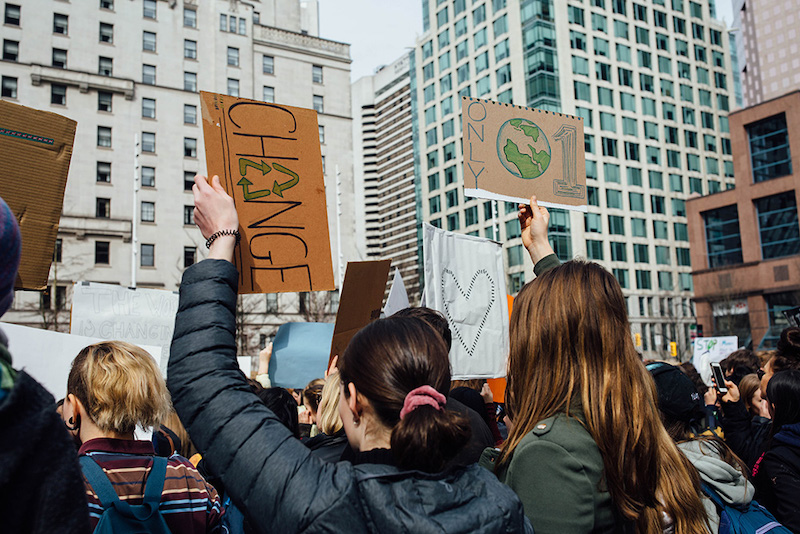The provincial government may have no plans to lower the voting age to 16, but B.C. teenagers will be glad to know that the proposal has strong support among Tyee readers.
Advocates have made progress in advancing the idea. In November delegates at the BC NDP convention voted in favour of the Young New Democrats’ proposal to lower the voting age to 16 in provincial and local elections. A few months earlier the Union of B.C. Municipalities passed a resolution calling for the government to lower the voting age in local elections. Both the federal NDP and Greens also proposed lowering the voting age in their 2019 election platforms.
We wondered what Tyee readers thought of the idea, so we asked in a recent informal poll. About 65 per cent of respondents said they were for it, 31 per cent said they were against it, and four per cent said they didn’t know what they thought about the idea.
(It’s important to note that Tyee polls aren’t scientific and aren’t intended to be seen as representative of B.C. public opinion. They’re simply quick and engaging snapshots of our readers’ opinions on various topics.)
Readers echoed one of the more compelling arguments for lowering the voting age — that an earlier vote makes people more likely to vote for the rest of their lives. We’ve edited some of the submissions lightly for clarity.
I think a lot of 16-to 18-year-old students are more aware of current events than older adults. I believe if you start voting when you are 16, you will be a lifetime voter. It will become habit and you will have fulfilled a sense of duty as a citizen of a democracy. A lot of people over 18 have started very busy lives; post-secondary education, relationships, children, jobs etc. and may not vote because they have not followed the issues. Having voted prior to entering this very busy part of their lives, they may vote more often than if they did not have the chance to vote at 16 years old.
People complain young people don’t show up to vote. Catch them while they are still in school to form the habit.
The sooner we get our youth used to voting the better. Also, they are the ones left to clean up our messes.
More of a stake in the future, frankly older voters generally vote out of fear, rather than change, we need that balance. Starting voting earlier may encourage lifelong voting.
Many readers noted though that 16-year-olds can be as mature and informed as adults and so should be able to vote.
“16-year-olds can’t do worse than current voters,” one reader wrote. In fact, some argued the youth activism we’ve seen around the world makes a strong argument for a lower voting age.
The young people are the ones marching in the streets to save the ’ole folks who are too consumer-driven to realize they are spending their way to a precipice. The young people deserve the right to vote for their future.
Some people also linked the right to vote with paying taxes, though there were varying perspectives.
One reader said that “anyone who pays taxes should be allowed to vote.”
Another took a different view.
Not everyone is an income taxpayer. Maybe this is due to how people make their money, or being a university student, or living in poverty. But everyone is a citizen and gives to the community in their own way, and not paying income tax shouldn’t exclude anyone from a vote.
Several people argued a lower voting age is simply just and fair.
It will give the youth a say in the future of their province, which by the age of 16 is something about which they should have a say.
If you want more inclusive feedback to issues for a better world, you must include the voice of the people that will inhabit it. The youth are already showing the world their strength to change by the numbers in the streets. The planet needs their fresh, intelligent and active output to completely change we live on the Earth.
Why not let the youth speak their mind, after all this will be their Earth in less time than we think. Why shouldn’t we let our children and grandchildren and niece and nephews have a say in what condition they get their planet in? After all, the ones voting will be citizens who want to see a change for a better…
Several of the readers who were not in favour of lowering the voting age worried were too uninformed or young to make sound decisions.
Are kids that young, with all due respect, properly informed and have a proper approach to the process of voting?
18 is barely old enough to make completely rational decisions.
For any democracy to succeed requires an informed electorate. This country clearly fails in that regard (big time) so adding another ill-informed, immature and naive cohort could help how?
There were also similar concerns that younger teenagers could be influenced by the people around them and that youth are more easily swayed.
When I was 16, I would have voted with my father. Maybe that would have been a good thing, but it would have given him a greater value as a voter. We need a better voting system more than this.
Some readers were only in support of the idea if teenagers are educated and informed. A few suggested that the right to vote for teens be paired with civics education in schools.
I’d support it if civics were taught in school.
Maybe once they’re educated, not before. Don’t need uniformed voters voting, that would be a disaster in the making.
I don’t think young people at age 16 are any more mature than I was at that age. A few, perhaps, but not the majority. On the other hand, if they were taught civics along with history in school, this might change my perspective. Still, probably only those students who have had the education would be more inclined to vote. I think 18 is soon enough.
Quite a few readers agreed that we should lower the voting age, but that we shouldn’t stop there, recommending other proposals and democratic reforms as well.
The youth of today may vote, but they have to get on with direct action or they may never get what they see as important.
It’s their future that we oldies are planning, so why shouldn’t they have the right to vote? BTW, make voting mandatory as well.
I think that when you are 16, a conversation with your peers is important as well as with your family. How to vote will be one of these and politicians might start thinking about universal free education so that low-income students are not excluded.
Society gives 16-year-old children the right to drive, after fulfilling specific requirements, but society gives the right to vote based on having a birthday, or 18 of them. If we want to have a responsible society, we need to allow citizens to be responsible. But why just 16-year-olds? All citizens should be enfranchised by allowing parents the proxy vote for their children. Then all citizens would have a voice in government.
And one reader offered a very exciting car analogy.
The idea that someone is old enough to drive a car (an activity in which a moment’s inattention can very easily kill or maim others), but is not mature enough to vote is just weird. Do it NOW!
Tyee polls are intended as a quick and engaging non-scientific snapshot of our readers’ opinions on various topics that fit with The Tyee’s very broad editorial mandate. They are not intended to be seen as a representative sampling of B.C. opinion. See more polls here. ![]()
Read more: Rights + Justice, BC Politics
















Tyee Commenting Guidelines
Comments that violate guidelines risk being deleted, and violations may result in a temporary or permanent user ban. Maintain the spirit of good conversation to stay in the discussion.
*Please note The Tyee is not a forum for spreading misinformation about COVID-19, denying its existence or minimizing its risk to public health.
Do:
Do not: